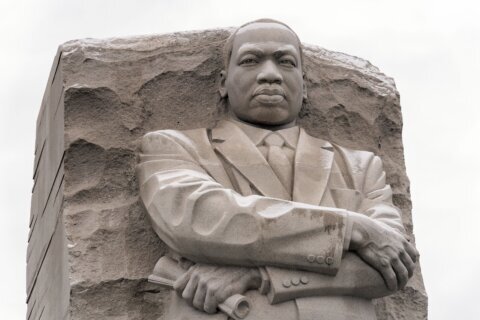The holidays are filled with activities, excitement, and very high expectations for a joyful season.
But for families experiencing the loss of a loved one, the holidays can be especially tough.
Children and grief
When it comes to children, Andy McNeil, senior advisor for Youth Programs at the nonprofit Tragedy Assistance Program for Survivors or TAPS, told WTOP in an interview that it’s common to hear that “kids are resilient, they bounce right back.” But, McNeil said, “kids are not resilient in a vacuum,” they need guidance and support from the adults around them.
Everyone, child or adult, grieves differently. Adults, McNeil advised, shouldn’t assume that children are doing just fine if they don’t bring up the loss of the loved one or if they seem to be carrying on as normal.
“Silent grief is not absent grief,” McNeil said.
He said adults who are having a difficult time with their own grief, or simply want to express it, shouldn’t hide it. Remaining stoic can leave a child feeling isolated.
“You create a situation where kids are left to grieve alone,” McNeil said, adding that there is one caveat to that advice. “And that is, you don’t want to make your grief your child’s grief.”
TAPS has programs that allow kids to talk about their feelings in a group setting.
“Peer support works,” McNeil told WTOP. “Because children will open up with each other and they’ll help us understand what it is that they need from us when we can open that dialogue.”
Make a plan
At holiday time, parents may want to withdraw from all the celebrations, but children “may actually have a need to participate,” McNeil said.
There are some strategies that can help. One is that the surviving adults can be upfront about how they’re feeling.
“Validate that you’re grieving, and that acknowledge to your child that this is going to be a difficult holiday for you,” McNeil said, adding that you will do what you can during the holidays and that as a family, you’ll “celebrate in the ways that you want to celebrate.”
He said that families can make a plan to design the holiday in a way that works for them.
“Part of that plan could be being OK with change,” McNeil said. “You don’t have to do everything that you’ve always done during the holidays,” he said, but maybe keep a few familiar traditions — ones that give comfort — in the mix.
This is also the time for a family to call on their support system.
“All those people who came through and told you in the past ‘If you need anything, let me know,’ reach out to them and this is the time to let them know,” McNeil said, adding they can help with errands, or invite your family over to participate in some of their holiday activities.
And try to be OK with the idea of change. “It doesn’t have to be the way it was in the past. This holiday will be what it is based on where you are as a family, and what you’re going through,” he said.
Find the joy
“Joy is not something we can manufacture,” McNeil said. “But we certainly can make choices to put ourselves in situations where we’re more likely to experience some level of joy and meaning and purpose over the holidays.”
“People will feel guilty,” said McNeil, “about feeling any sort of joy or happiness. It feels contrary to what you should be experiencing.” But he emphasizes, “the reality is we can experience both joy and sorrow at the same time.”
TAPS is a nonprofit organization dedicated to working with surviving families of service members and veterans.








